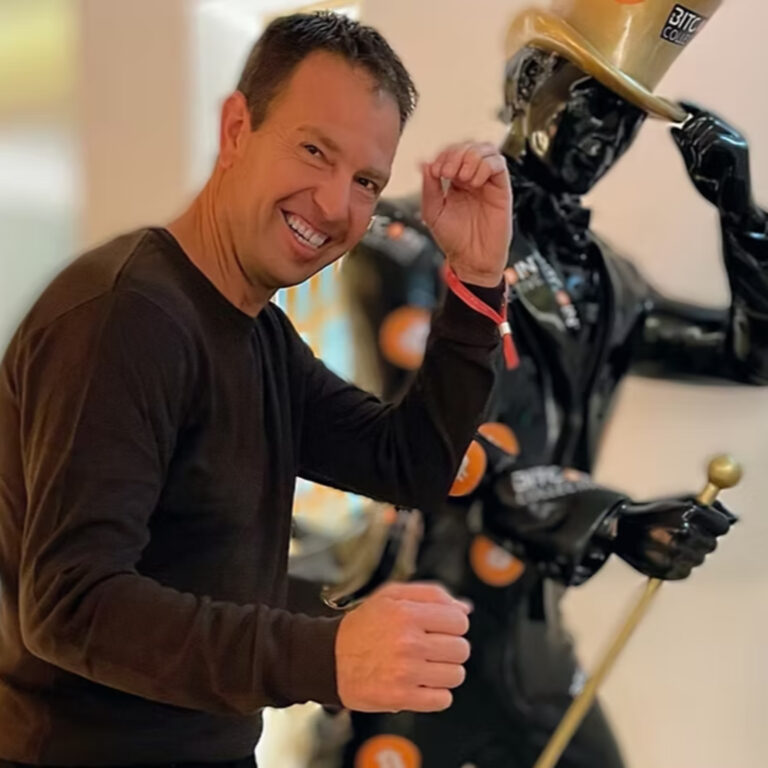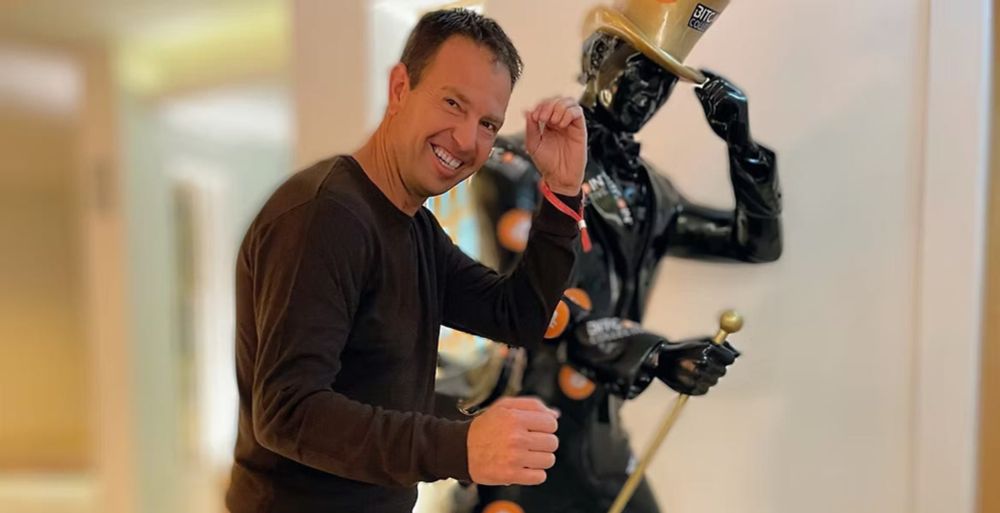
Jeff Booth is a visionary leader, technology entrepreneur and best-selling author of The Price of Tomorrow – Why Deflation is Key to an Abundant Future. With his expertise in technology, system thinking and design, he is at the forefront of a transition from an economic system built for the past, and one built for the future. Jeff has been featured in Forbes, TechCrunch, Inc.com, The Globe and Mail, BNN, Fast Company, Entrepreneur, Bloomberg, TIME, and The Wall Street Journal. In 2015, he was named BC Technology Industry Association’s (BCTIA) Person of the Year, and in 2016 Goldman Sachs named him among its 100 Most Intriguing Entrepreneurs.
He is a Founding Partner of ego death capital, Co-Founder of addy and NocNoc. He has been a Young Presidents Organization member since 2004 and contributes time as a Founding Fellow at the Creative Destruction Lab. Jeff currently sits on the boards of Scoop Solar, Terramera, Fedi and Breez.
Jeff Booth is a visionary leader, technology entrepreneur and best-selling author of The Price of Tomorrow – Why Deflation is Key to an Abundant Future. With his expertise in technology, system thinking and design, he is at the forefront of a transition from an economic system built for the past, and one built for the future.
Jeff has been featured in Forbes, TechCrunch, Inc.com, The Globe and Mail, BNN, Fast Company, Entrepreneur, Bloomberg, TIME, and The Wall Street Journal. In 2015, he was named BC Technology Industry Association’s (BCTIA) Person of the Year, and in 2016 Goldman Sachs named him among its 100 Most Intriguing Entrepreneurs.
He is a Founding Partner of ego death capital, Co-Founder of addy and NocNoc. He has been a Young Presidents Organization member since 2004 and contributes time as a Founding Fellow at the Creative Destruction Lab.
Jeff currently sits on the boards of Core Scientific, Scoop Solar, Fedi and Breez.
Listen to my last audio podcast with Jeff Booth
Jeff wrote a really interesting article on Bitcoin Finding Signal In A Noisy World

Transcription
Pemo: Welcome, Jeff. Thanks so much for taking the time to speak to me today. Been reading your book and very interested in your perspectives. So, the future is tomorrow? Anyway, I was wondering if you could basically give me a little bit of feedback about ego Death Capital and what you guys like to invest in.
Jeff Booth: Sure. As I predicted in the book, The Price of Tomorrow, we were in a phase transition between what used to work, an inflationary monetary system, to one that would work on a deflationary basis. What that meant is technology was moving so fast that productivity through technology, us solving problems, should flow to society in the form of lower prices. But because if it was allowed to flow to society in the form of lower prices, our entire credit or debt-based system would collapse. You were at a quandary with two systems moving in different directions. One, the system we lived in with manipulated money, having to manipulate money faster and faster and faster to ensure prices went up to protect $400 trillion of debt from collapsing in a world that we were moving to, which was based on sound money and sound concepts that would price that transition.
And so Bitcoin became the first layer of that transition. And you could look at it as a bearer instrument in the new peer-to-peer web. But for a long time, Bitcoin, because it was decentralized and secure, it couldn’t scale it. And so a whole bunch of other coins were developed and a whole bunch of other things, essentially to solve the scaling problem or to try to create a whole bunch of wealth by doing something different, unique that Bitcoin couldn’t do.
But we saw in ego Death Capital. And what we saw, what was happening is actually Bitcoin was the first layer of a protocol technology. And then what would happen as lightning, a layer on top of that, which would allow scale would emerge, and then a whole bunch of other layers would be built on top of Bitcoin and you’d have a new web being formed with native money into it. And so that’s where we place our bets right now is on the transition, all of the entrepreneurs building those new rails for the new financial and economy that’s being built on top of Bitcoin.
Pemo: Fabulous. Well, you were a little bit ahead of the ball, it appears.
Jeff Booth: A fair bit. My book came out in late 2019, but it literally predicted all of the events that we’re going through right now. Because if you understand that these are just two, it’s a system problem. It’s not a people problem. There’s just no way that the system can… If the system tries to tighten or raise interest rates too much, the entire banking system globally collapses. So you know it has to manipulate money further and further, and there has to be a fix to that. So understanding what Bitcoin was and fixing that just now affords an opportunity then to build into… Oh, by the way, I just want to say this. I actually totally understand why all the venture capitalists and everything else went to the ecosystem generally because they mistook Bitcoin as a protocol technology, as a base layer. And so they thought that you could achieve value on top of other coins, but all of those other coins are going to go to zero.
And you have an entire ecosystem. It’s super exciting. If people could see what was actually happening in this ecosystem with what… Similar to, and that’s why I use protocol technology. Most people don’t realize TC, they don’t even talk about TCP IP as the base layer to the internet. And even if you ask them on layer four, http, the HyperX texts that brought the worldwide web together in 1989, most people wouldn’t have seen what was going to come on top of that protocol stack. And that’s how protocols develop. They harden. They harden, harden. And that’s what happened to Bitcoin over 14 years. It’s more decentralized, more secure today because it’s hardened, hardened, hardened. And only then can the next layer come on top of it. And only then can you start to see what’s possible to build on top of that.
Pemo: Really appreciate your perspective. I’ve been following Bitcoin since 2008. I had a business in Dublin and Ireland then. And the only reason I was following it, not through your sort of wisdom, was really because I just thought there’s got to be some alternatives because the incumbent banks totally did, put women at a disadvantage. And I remember years before in Australia when I was divorced with three little babies, no one would give me credit because I was working from home and I was a woman. And since then I have spoken to and interviewed very successful women, and particularly a lady who started Dermalogica told me that when they worked with Kiva, that women actually had higher rates of paying back loans than men. So there’s some disparity there in the whole system that I could see. It was just my own personal little corner.
Jeff Booth: But that disparity is everywhere, effectively the existing system. And I wish this wasn’t true. So what I’m saying, yeah, I truly wish it wasn’t true.
Pemo:Yeah, I do too.
Jeff Booth: Nobody votes for inflation. You don’t actually have a vote. We think we actually have a free vote, but most of the revenue from the government comes from inflation, which is actually just a theft, because inflation is wage deflation. So some people get more money. If you hold assets and stocks, you actually increase your wealth and it takes it from wage deflation or savings. So people get paid less to afford that. So this really simple question would go like this. What would the world look like if the emergent complex behavior of society was based on theft that had to expand at a greater rate? Who would win? Who would lose? So partly why I decided to start ego Death Capital was I’m going to invest my time in the world I want to see for my children rather than reinforce a system that is based on tuft.
Pemo: Great. Yahoo. Yahoo for you! So my other question, and again because I don’t have this wonderful oversight that you have, is what’s happening in the startup ecosystem in Silicon Valley at the moment? I know Marc Andreessen, I think last year said, “We are watching the fall of Rome.” And of course, he didn’t imply that he was involved in that or had caused that. For me, it’s heartbreaking because it’s my community and both the venture capitalists and the startups, and now I’m hearing things that I didn’t know about. Again, my ignorance. Put my hand up there. That some of the big tech companies have been employing people just to get them out of being employed by anyone else. And a lot of them were sitting on their hands. It’s really disillusioning, particularly when I’ve invested so much time and focus into this startup ecosystem. Could you give me some insights around some of this stuff? Startups-
Jeff Booth: So that’s a big question and it’s something it’s tied to the same thesis. So I would encourage you to look and your audience to look up an article that I wrote. This is going back maybe six months ago, called Finding Signal in a Noisy World. And it applies to exactly what you said. So the system we live in and we measure by is today 10,000 times bigger than Bitcoin. It is insolvent. And so the only way it’s solvent is to manipulate money at a greater rate. And all of the people trying to make more money in that system, including venture capital, are trying to find a return that is higher than the rate of inflation. That includes pension funds. And as they do that, they take more and more risks and more and more gambles and more and more short term, well, let’s just make enough money fast to be able to get out of this. And they make the whole system more and more unstable at the same time.
So that transition, it doesn’t matter what kind of actors are in there, whether those actors used to actually build really great venture capital companies because they thought about long-term companies that could create value for society. That is no longer the case, unfortunately, because it’s turned into just an incentive game around making a quick buck. And what’s totally changed, and this is why you’ll see, and for people who haven’t done a deep investigative research on what Bitcoin or what I’m talking about, this is going to come as a shock because you’ll think Bitcoin is a Ponzi scheme. And so I would just encourage people because you’ll think that because you’ll look through the system bias. You’ll look through all of those actors in the system trying to tell you, trying to show misinformation about what it is.
Because you’re measuring everything from that system. If you look deeper, what’s happening is the transition… Effectively, Bitcoin is repricing, Bitcoin isn’t going up in value. All prices are falling relative to it. And that’s an important, important distinction. Because in economics, it’s a really simple premise. Prices fall to the marginal cost of production, period. That’s why the oxygen you breathe is free because you can’t price it unless you’re pricing it underwater or in space. And that’s why the calculator app on your phone is free. Prices fall to the marginal cost of production, and technology is making that price fall at an exponential rate with artificial intelligence. So you can try to stop that by regulating it. But when you regulate an industry, what happens is a technology empowers somebody else somewhere else, and that essentially moves eventually to attack that regulated industry from somewhere else.
So it’s long since known in economics, the prices fall to the marginal cost of production. And I should just have to say exclamation mark, I shouldn’t have to say another thing. But because most people are measuring their life through a system of manipulation, they think their house is going up in value. They think all of these things are going up in value when it’s only being diluted by the money underneath. And what Bitcoin does, because it’s fixed, is it tells you the truth of what’s happening. So if you measure your life in Bitcoin instead of fiat, you’ll see all prices falling to the marginal cost of production over time. But if you’re measuring Bitcoin in Argentina in lira or Turkish lira, you’ll think it’s going up in price.
Pemo: So if you’re in El Salvador, is it easier to see what’s going on?
Jeff Booth: I’ve been to El Salvador and I spent time, and what I would say is I’ve been to a high number of countries on this planet. What I would say is without fail, when you actually meet people in these countries, they’re just like you and I. They have the same hope, same dreams, same everything else. Bitcoin is early in El Salvador. And so to say it’s everywhere, it’s not everywhere. So there’s some regions where you can pay with Bitcoin for most things. In some regions it might be still less than 5% of all purchases, but it’s created this very hopeful community and more and more free market actors are moving to El Salvador to take advantage of what’s happening.
Pemo: Wow. Very positive. Let’s end on that positive note. Thank you so much, Jeff. Totally enlightened me, and I’m sure my listeners will really appreciate all your insights and hopefully get a hold of your book. And I’ll definitely put the link to that article that you’ve written. Really appreciate your time and your expertise. Thank you so much.
Jeff Booth: Anytime, Pemo. Thanks.
Pemo: Thanks.

















